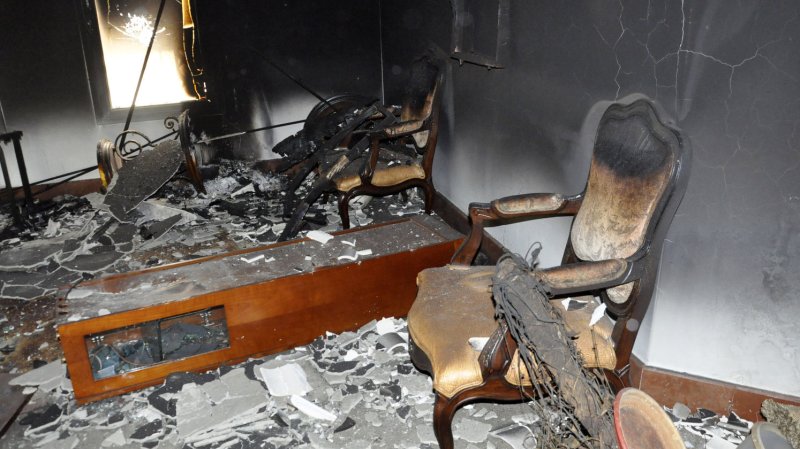A burnt building is seen at the United States consulate, one day after armed men stormed the compound and killed the U.S. Ambassador Christopher Stevens and three others in Benghazi, Libya on September 12, 2012. UPI/Tariq AL-hun |
License Photo
WASHINGTON, Nov. 2 (UPI) -- The CIA was the real commanding agency at the attacked U.S. Consulate in Benghazi, Libya, not the State Department, senior U.S. intelligence officials said.
In addition, two of the four men who died in the Sept. 11 attack -- former Navy SEAL commandos Tyrone Woods and Glen Doherty -- were actually CIA contractors killed defending the mission, not State Department contract security officers, as originally publicly identified, the officials told several news organizations on condition of anonymity.
Also killed in the attack were U.S. Ambassador Christopher Stevens and U.S. Foreign Service Information Management Officer Sean Smith.
The intelligence officials said that within 25 minutes of being alerted to the attack in a desperate phone call, the CIA rushed a half-dozen security operatives to the mission from a secret base about a mile away.
The operatives, who arrived at the mission about 25 minutes after that, joined State Department security agents in a futile search through heavy smoke and enemy fire for Stevens, the officials said in the most thorough account to date of the assault and of the CIA's authoritative role at the consulate.
The operatives evacuated mission personnel and took control of an unarmed U.S. military drone to map possible escape routes, the officials said. The MQ-1 Predator drone, used by the CIA for reconnaissance, began providing video surveillance.
In the midst of the assault, the operatives also dispatched an emergency reinforcement team from Tripoli, the capital, and chartered aircraft that ultimately carried surviving U.S. personnel to safety, the officials said.
The militant assault went quiet around 1 a.m., the officials said in a written account that said the pause lasted until almost daybreak and apparently led CIA and State Department officials to think the danger had passed.
But just before dawn -- and not long after the CIA-led reinforcement team, including two military commandos, arrived from Tripoli -- the militants launched a brief but deadly mortar attack that surprised the Americans, the officials said.
Two CIA security officers defending the base from a rooftop -- Woods and Doherty -- were killed in the attack, the officials said.
Of the more than 30 U.S. officials evacuated from Benghazi, only seven worked for the State Department, officials briefed on the intelligence told The Wall Street Journal. Nearly all the rest worked for the CIA, under diplomatic cover, which was a principal purpose of the consulate, the Journal said.
Most public criticism for consulate security lapses has so far been directed at the State Department, not the CIA. U.S. Secretary of State Hillary Clinton said last month she took responsibility for what happened.
The new information does not address the Obama administration's various depictions of whether the assault was a protest that turned violent or a planned terrorist attack. But the officials reiterated early intelligence was patchy and often contradictory. They said talking points for members of Congress and senior administration officials did not at first discuss possible links between the attackers and al-Qaida because the information was classified.
"It wasn't until after the points were used in public that people reconciled contradictory information and assessed there probably wasn't a protest around the time of the attack," a senior U.S. intelligence official said in a statement.
Congressional investigators say it appears the CIA and State Department weren't on the same page about their respective security roles at the consulate, which the Journal said raised questions about whether the Benghazi security arrangement was flawed.















